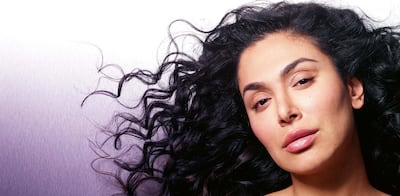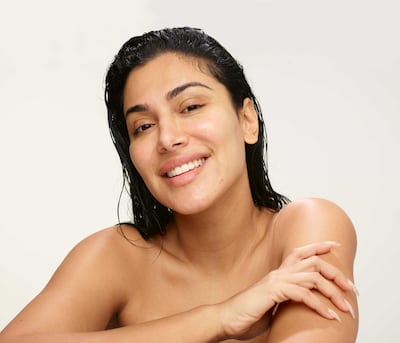I do not start out as a Huda Kattan fan. I start out with infinite respect for a woman who has built a $1.2 billion (Dh4.4 billion) business from scratch, based largely on the power of her personality. But I also can’t shake the feeling that in a world where there is so much emphasis on what women look like, and so much pressure for us to adhere to increasingly narrow ideals of beauty and femininity, Kattan may be part of the problem.
So, when we sit down in the pink-hued JLT headquarters of Huda Beauty, I present the blogger-turned-beauty-mogul with my quandary. Does she ever feel like she is feeding into a system designed to make women feel inadequate?
“I think if I didn’t put myself out there and I wasn’t honest about my fillers and my Botox and my own plastic surgery, and if I didn’t go barefaced, then yes, I would be a part of that,” she responds, thoughtfully.
“As somebody who is in the beauty industry, I have a huge responsibility to try to be honest, because the reality is that we post these pictures that look perfect – they are Photoshopped, they are Facetuned, we have so much make-up on. Is it right that this may create a feeling within people that they need to be more beautiful? Yeah, it might, and that’s why being honest is so important.”
Kattan does not shy away from the difficult questions
Here's what I learn about Huda Kattan. She does not shy away from the difficult questions. As her 41.4 million and growing Instagram followers will no doubt attest, she is not afraid to show vulnerability. She is warm and charismatic, and calls her employees "baby". She is also the kind of woman who compliments other women – a sure sign she is part of the sisterhood – and in my case at least, forces them to confront some of their own subconscious prejudices.

Perhaps paradoxically for someone who found fame teaching people how to cover their flaws, authenticity is the cornerstone of the Huda Kattan brand (a sample Instagram post: “How old were you when you tried your first beauty product? I was 9, it was a pair of tweezers, I plucked away my moustache”). And she has taken that honesty to a whole new level with her latest launch.
Having started out as a beauty blogger in 2010 and launched her eponymous make-up brand in 2013, Kattan has now expanded into skincare, with her Wishful line. Her debut product, the Yo Glow Enzyme Scrub, is a manifestation of her struggles with her own skin over the years. "Skin is a funny thing," she says. "Because you wear it. Every single day. And it's either something you feel really proud of. Very rarely. Or many times, you wish it was something else.
“I’m Middle Eastern and in the Middle East, traditionally, they haven’t liked richer skin tones. They’ve liked very fair skin tones. And I grew up thinking that my skin wasn’t light enough, which wasn’t right.
"Then I went to a different time in my life when I had acne – adult acne, which is so embarrassing, because everybody’s already gone through puberty and gone through their issues, and now all of a sudden you’re experiencing it. So I never felt good about my skin. And that really bothered me.”
There were plenty of naysayers when Kattan decided to launch her beauty brand, and probably just as many when she decided to make the move into skincare, an already crowded marketplace dominated by big conglomerates such as Estée Lauder, Lancôme and L'Oréal. But at a time when she herself was using 12 or 13 products as part of her daily skincare routine, she felt compelled to simplify things – and she was sure she had something to contribute to the industry.
She wanted to create “an easy, simple, gentle and effective” skincare solution. Yo Glow, an exfoliating scrub infused with pineapple and papaya enzymes, and alpha and beta hydroxy acids, promises to give users smooth, radiant, glowing skin immediately – but also offers longer-term benefits.
When it came to promoting Wishful, Kattan decided to flip the script. As part of the campaign for the new launch, the perennially caked, baked and contoured Kattan foregoes any cosmetics, filters and Photoshop – no small act of bravery for a woman who admits to using make-up as a form of armour.
“I was kind of frustrated with some of the photos I had seen in the industry for skincare – where the women looked perfect, where the women were Photoshopped, where the women were wearing make-up. I said to my team: ‘I really want to do this photoshoot where I don’t wear any make-up and I don’t want to Photoshop any of the images.’”
It sounded like a good idea at the time, but when the day of the shoot came around, Kattan's confidence faltered. "I felt anxiety. I had a very stressful week that week. I knew I was going to be taking these photos and I knew I wasn't going to have my make-up. I started feeling really insecure. Now, I love being in front of the camera. I love to work the camera; I love to work my angles. And all of a sudden I got in front of the photographer and I didn't know how to pose.
"I lost all my confidence, all that strength I had built before, and I realised that I did not have my armour; I didn't have my make-up. And I also didn't have Photoshop. I just felt really, really vulnerable. I didn't even want to look at the photos. I didn't expect to feel that way," she recalls.
“And then I saw the photos and I had this really emotional epiphany, where I looked at them and I was like: ‘Huda, that woman, she is not perfect, but she is who she is and has worked so hard, and the fact that she is not perfect makes her who she is. And dammit, that’s beautiful, she deserves to be loved.’”
Growing up 'I never felt like I was good enough'
Self-love emerges as a recurring theme in our interview. Kattan's parents were Iraqi immigrants who moved to the US, and Kattan grew up with the sense that she didn't quite fit in. It seems likely that those feelings of inadequacy spurred her to become the enormously successful businesswoman she is today, but they are also insecurities that have been hard fought. "That was a challenge, just growing up in America with immigrant parents, but also not having money," she says. "My parents were on welfare. Not having certain means – even basic means – was hard.
“I definitely felt like I was not up to the measure that my peers were at. And it felt really bad. And it definitely built this thing in me where I never felt like I was good enough, and it was a struggle because it took me a long time to recognise that I was always trying to prove myself. I feel like I am fortunate to have figured that out. Some people never realise why they have these feelings and emotions, and when I finally had that epiphany – that I’m still trying to prove to these kids from Tennessee that I’m good enough – it was a startling realisation.
“Do I still struggle with that? Do I still feel inadequate? A lot of the time, yeah. It’s a feeling that’s within me. I’m doing my best to get out of it – but a lot of times, it’s us. We are our worst enemies. We either doubt ourselves or don’t trust ourselves enough, or believe in ourselves enough. And that’s not the right thing. Confidence is amazing. My daughter has so much confidence and I want to make sure she feels so powerful when she gets older.”
Kattan dubs herself a feminine feminist ("I believe that women can be feminine and also very strong, and are very much equal to men. That's the essence of feminism"), but as a woman at the helm of one of the fastest-growing beauty brands in the world, she is also used to people underestimating her.
"I still have people who come in and still assume that I am just the face of the brand. They assume that I don't know why the products are created or how they are created, or that I can't make a business decision. And it's always a rude awakening for them. I have that tough side to me and when I have to pull it out, I do. I can be a sharky businesswoman, but I can also be a kind, nurturing leader and mentor."
She is heavily involved in every aspect of the business and very focused on getting the company culture right – but also concerned with what kind of impact the brand will have in the long run. “As much as I love the beauty industry and I love beauty, I don’t know that the industry itself is really beautiful. The women in beauty – the way they treat each other – is worse than you would see in fashion. And that’s not right. We are selling something that’s emotional. The beauty industry needs to be better.”
And there is my answer. I may not start out as a Huda Kattan fan. But I end up a convert.



